
A uxiliary engines, as they were called in the old days, were hot, noisy, smelly lumps of metal that weren’t usually powerful enough to motor into wind or tide. My first yacht, which I bought in 1979, had a single-cylinder Stuart Turner petrol engine. It had about three moving parts, tended to misbehave on the starboard tack, but reacted remarkably well to a shouted command to buck up when its sense of duty was wanting. Its power output was less than the average lawn mower and if full astern was engaged 20 yards before her berth (metres had not been invented back then), there was a fighting chance the boat would stop before causing too much damage. On the upside, it was easy to maintain and could be removed from the boat and taken home in the boot of the car.
My second boat, an elderly 28ft Twister, had an unreliable two-cylinder petrol engine which I soon replaced with a brand new Bukh 10 diesel, doubling the horsepower at a stroke. Basic maintenance was still within my capabilities – a set of spanners and a hammer solving most problems. Then engines became more sophisticated and the cost of spare parts rocketed. We had another two boats, each with slightly more powerful ‘donks’, before we bought Kudu, a Hallberg-Rassy 34, in 2005. Her original 1998 29hp Volvo Penta MD2030B was archaic by today’s standards but, apart from changing the oil, filters, impellers and the occasional worn out rubber hose, there wasn’t much that could be done before professional help was needed. And so, towards the end of the 2021 sailing season, the saga began...
COOLANT LOSS
Denne historien er fra July 2024-utgaven av Yachting Monthly UK.
Start din 7-dagers gratis prøveperiode på Magzter GOLD for å få tilgang til tusenvis av utvalgte premiumhistorier og 9000+ magasiner og aviser.
Allerede abonnent ? Logg på
Denne historien er fra July 2024-utgaven av Yachting Monthly UK.
Start din 7-dagers gratis prøveperiode på Magzter GOLD for å få tilgang til tusenvis av utvalgte premiumhistorier og 9000+ magasiner og aviser.
Allerede abonnent? Logg på

Midsummer on Hanö
This wonderful little island in the south-east of Sweden is a real gem off the beaten track
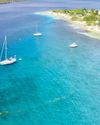
ADVENTURE SAILING TO HAITI
After spending two months in the Dominican Republic, Andy Brown sails west to Haïti bringing medical and school supplies to the town of Mole Saint Nicholas

In celebration of bad sailing
New owner Monty Halls tests his sailing skills with his family aboard their Colvic 34 ketch, Sobek. A recently qualified Day Skipper, Monty faces a few unexpected challenges...

Winter brings excitement and opportunity
Oddity’s double glazing, insulation and heating create a warm, homely environment as I bash out this column.
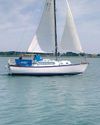
ADVENTURE MAISIE GOES TO GOES
To depart or not to depart? That is the question. Is it safer to stay, or suffer the wind and weather of a rough North Sea?

'MAYDAY, GRANDAD OVERBOARD!'
When David Richards and his grandson Henry went out racing from lowey, they didn't expect their sail to end with a lifeboat rescue
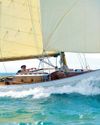
VERTUE
For a 25-footer, the Vertue has a huge reputation and has conquered every ocean. So what makes this little boat quite such an enduring success? Nic Compton finds out

Sailing siblings
Mabel Stock, her brother Ralph, a friend Steve and an unnamed paying passenger passed through the Panama Canal in December 1919 on the sturdy Norwegian cutter Ogre. They were towed to a quiet anchorage in Balboa away from the boat traffic but within rowing distance of the shore.
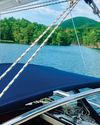
TECHNICAL MAINSAIL MODIFICATIONS
Safety and performance improved hugely when Mike Reynolds reduced the size of his mainsail and re-configured the systems controlling it
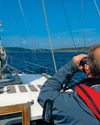
PILOTAGE DONE PROPERLY
Chartplotters are an amazing aid, but can detract from your real-world pilotage if not used with caution, says Justin Morton